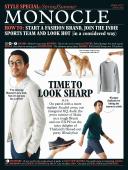
Issue 102
How to: start a fashion brand, join the indie sports team and look hot (in a considered way). Plus: On patrol with a more vigilant Swedish army, our inaugural HQ Audit, the prime minister of Malta on a tough Brexit and our EXPO on the juicy delights of Thailand’s blissed-out party Wonderfruit.
In This Issue
Oops! No content was found.
Looks like we no longer have content for the page you're on. Perhaps try a search?
Return Home

